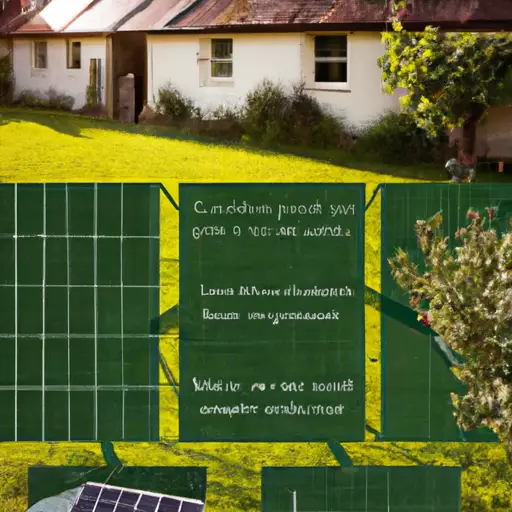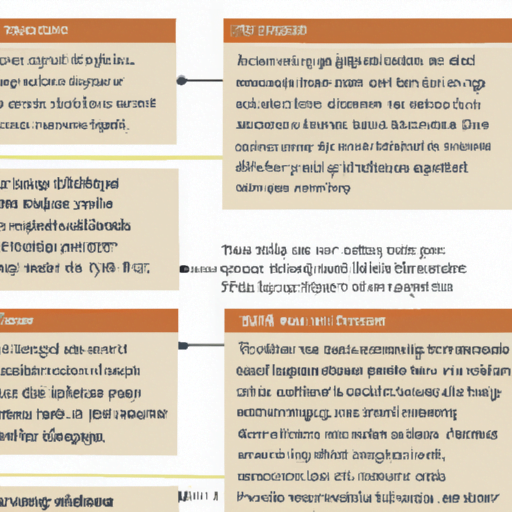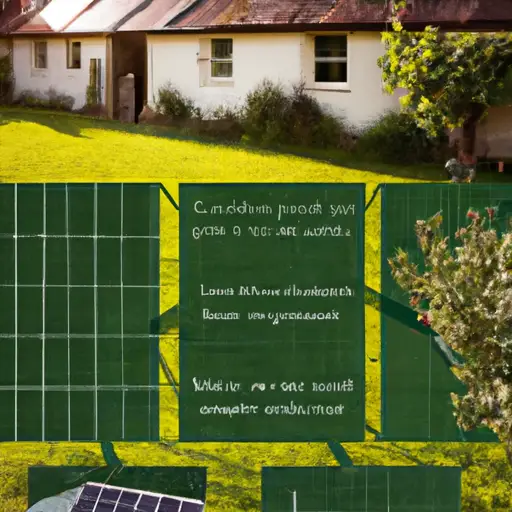Have you ever wondered what it would be like to live off the grid? To disconnect from the hustle and bustle of modern society and embrace a simpler, self-sustainable lifestyle? Well, you’re not alone. Many people are increasingly drawn to the idea of living off the grid, and it’s no surprise that the trend is gaining traction across the UK.
In fact, there are quite a few off-grid communities in the UK that have emerged in recent years. These communities are made up of individuals and families who have made the conscious decision to live a more sustainable and self-sufficient lifestyle. They generate their own electricity, collect rainwater, grow their own food, and even create their own systems for waste management. While it may seem like a challenging endeavor, these communities show that it is indeed possible to live off the grid in the UK.
In this article, we will delve deeper into the off-grid living movement in the UK. We will explore the motivations behind choosing this lifestyle, the challenges and rewards that come with it, and the different approaches that off-grid communities take to sustainable living. Whether you’re considering making the move yourself or simply curious about this alternative way of life, this article will provide you with a comprehensive overview of off-grid communities in the UK. So, let’s get started and learn more about the off-grid lifestyle that’s gaining momentum in the UK! Yes, there are several off-grid communities in the UK. Off-grid living refers to living without any reliance on the conventional power grid and other public utilities. It involves generating your own electricity, sourcing your own water, and managing your waste in a sustainable manner. Off-grid communities are groups of people who have chosen to live this lifestyle collectively, often in rural areas. In this article, we will explore why off-grid living is gaining popularity, the benefits and challenges of off-grid living, an overview of off-grid communities in the UK, factors to consider when exploring off-grid communities, prominent off-grid communities in the UK, life in off-grid communities, challenges and obstacles, the future of off-grid living in the UK, and conclude with a summary of the benefits and challenges of off-grid living and the need for sustainable and community-focused solutions.

Why Off-Grid Living is Gaining Popularity
Off-grid living is gaining popularity for a variety of reasons. Firstly, it allows individuals to have greater control over their energy consumption and reduce their carbon footprint. By generating their own electricity from renewable sources such as solar panels or wind turbines, off-grid communities can significantly reduce their reliance on fossil fuels. This not only benefits the environment but also helps individuals save on energy costs in the long run.
Secondly, off-grid living promotes self-sufficiency and resilience. By producing their own food through practices like permaculture and raising livestock, off-grid communities can reduce their dependence on the industrial food system. This provides a sense of security in times of food scarcity or disruptions to the supply chain.
Thirdly, off-grid living offers a chance to reconnect with nature and live in harmony with the environment. Many people are drawn to the idea of living in remote rural areas, surrounded by beautiful landscapes and abundant wildlife. Off-grid communities often prioritize sustainable practices such as responsible land management and conservation, further enhancing their connection to the natural world.
Benefits and Challenges of Off-Grid Living
While off-grid living offers numerous benefits, it also presents certain challenges. One of the main benefits is the reduced reliance on external systems and the associated freedom that comes with it. Off-grid communities have the opportunity to create their own rules and live according to their own values, fostering a sense of autonomy and self-governance.
Another benefit is the strong sense of community that often develops within off-grid communities. These communities are often close-knit and cooperative, with members supporting each other in various aspects of daily life. This sense of belonging and shared responsibility for the well-being of the community can greatly enhance individuals’ quality of life.
However, off-grid living also presents challenges. Financial constraints can be a significant hurdle, as setting up off-grid infrastructure can require a substantial initial investment. Renewable energy systems, water collection and treatment systems, and sustainable waste management solutions all require upfront costs. Additionally, the ongoing maintenance and repair of these systems can be expensive.
Furthermore, legal and regulatory hurdles can pose challenges for off-grid communities. Building codes and zoning regulations can limit the types of structures and systems that can be implemented, making it difficult for communities to fully embrace off-grid living. Some communities face resistance from local authorities who may view their lifestyle as unconventional or non-compliant with existing regulations.
Maintaining community cohesion is another challenge that off-grid communities face. Living in close proximity to one another, sharing resources, and making communal decisions can sometimes lead to conflicts or disagreements. Effective communication and conflict resolution skills are necessary to ensure the long-term viability and harmony of the community.
Extreme weather conditions can also pose challenges for off-grid communities. Remote locations, especially in the UK’s often unpredictable climate, can make access to essential supplies and services difficult during severe weather events. Proper planning and preparation are essential to mitigate the risks associated with extreme weather.

Overview of Off-Grid Communities in the UK
The UK is home to several off-grid communities that showcase different approaches to sustainable living. These communities are spread across the country and vary in terms of size, infrastructure, and practices. In the following sections, we will explore some prominent off-grid communities in the UK.
The Lammas Community
Located in Pembrokeshire, Wales, the Lammas Community is a pioneering example of off-grid living. Established in 2009, it was granted planning permission to build nine ecological low-impact dwellings on agricultural land. The community’s vision is to create a sustainable settlement that integrates ecological, social, and economic aspects. The dwellings utilize renewable energy sources and employ permaculture principles to cultivate food.
The Tinkers Bubble
Situated in Somerset, England, the Tinkers Bubble is a small off-grid community that focuses on low-impact, self-sufficient living. Since its establishment in 1994, the community has developed organic orchards, vegetable gardens, and grazing land. They generate electricity through solar panels and small-scale wind turbines, while water is collected from natural springs. The Tinkers Bubble emphasizes a simple lifestyle, embracing traditional skills such as woodcraft and woodworking.
Dancing Rabbit Ecovillage
Located in Missouri, USA, the Dancing Rabbit Ecovillage draws inspiration from the principles of permaculture and sustainable living. Although not in the UK, it serves as an exemplary model for off-grid communities worldwide, including those in the UK. The community prioritizes ecological practices, such as straw-bale construction, rainwater harvesting, and organic farming. Residents engage in communal decision making and share resources to minimize their ecological footprint.
The Findhorn Foundation
Based in Moray, Scotland, the Findhorn Foundation is a spiritual community that also embraces ecological sustainability. The community initially started as an experimental project in the 1960s, growing vegetables in a barren sand dune. Today, it has expanded to include eco-buildings, solar panels, wind turbines, and a living roof. The Findhorn Foundation focuses on the integration of spiritual values, sustainable practices, and personal growth.
These are just a few examples of off-grid communities in the UK and around the world. Each community has its unique approach to off-grid living, reflecting the diverse motivations and goals of its residents. By studying these examples, individuals interested in exploring off-grid communities can gain insights into the different possibilities and challenges they may encounter.
Factors to Consider when Exploring Off-Grid Communities
When exploring off-grid communities, several factors should be considered to ensure a successful and fulfilling experience.
Location and Accessibility
The location of the community plays a vital role in off-grid living. Consider the accessibility of the area in terms of proximity to essential services, healthcare facilities, and educational institutions. A remote location may offer a greater connection to nature but might also present challenges in terms of accessing supplies and services.
Community Size and Structure
The size and structure of the community should align with your preferences and goals. Some individuals may prefer a smaller, more intimate community, while others may thrive in a larger, more diverse group. Understanding the dynamics and decision-making processes within the community is essential for determining whether it aligns with your values and expectations.
Infrastructure and Services Available
Assess the existing infrastructure and services available within the community. Consider the availability of renewable energy sources, water collection and treatment systems, and waste management practices. Understanding the level of self-sufficiency and sustainability the community has achieved will provide insights into the lifestyle you can expect.
Sustainability Practices
Evaluate the community’s sustainability practices, such as permaculture, organic farming, and responsible land management. These practices play a crucial role in minimizing environmental impact and fostering a sustainable lifestyle. Assessing the community’s commitment to sustainability will help ensure that your values align with theirs.
Social and Cultural Dynamics
Living in an off-grid community requires strong social and interpersonal skills. Research the social and cultural dynamics within the community to determine if it aligns with your desired social interactions and values. Some communities may have specific cultural, spiritual, or ideological orientations that may influence your overall experience.
Prominent Off-Grid Communities in the UK
In addition to the previously mentioned examples, there are several other notable off-grid communities in the UK. These communities demonstrate various approaches to off-grid living and sustainable practices. Here are some more examples:
Twin Lakes Cottage Community
Located in the Lake District, Cumbria, the Twin Lakes Cottage Community is an off-grid development comprising several low-impact cottages and communal facilities. The community focuses on sustainability, self-sufficiency, and maintaining a harmonious relationship with nature.
The Brithdir Mawr Community
Situated in Pembrokeshire, Wales, the Brithdir Mawr Community is an ecologically conscious community that emphasizes communal living and permaculture principles. The community has developed eco-buildings, organic gardens, and renewable energy systems.
The Low Impact Living Initiative
The Low Impact Living Initiative (LILI) is a network of people and projects focused on promoting and enabling low-impact lifestyles. Although not a physical community itself, LILI provides resources and support for individuals and communities interested in off-grid living and sustainability.
These communities, along with the previously mentioned ones, highlight the growing interest in off-grid living and sustainable communities throughout the UK. Each community showcases different practices and approaches to sustainable living, providing a wealth of knowledge and inspiration for those interested in exploring the off-grid lifestyle.




